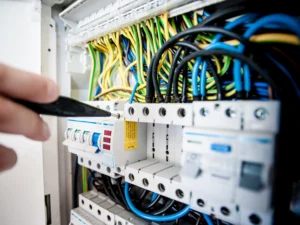
Menu
OrientMCT
Circuit Breakers and Switchgears (Advanced)
The Electrical Fault Finding and Troubleshooting course is designed to equip participants with the skills and techniques needed to identify, diagnose, and rectify electrical faults in various systems and equipment. The course covers a wide range of topics related to fault finding and troubleshooting methodologies, tools, and best practices.
Here are the key topics covered in the course:
Introduction to electrical fault finding: Understanding the importance of effective fault finding and troubleshooting in maintaining electrical systems’ reliability and safety. Exploring common types of electrical faults and their causes.
Electrical safety: Reviewing electrical safety practices and procedures when conducting fault finding and troubleshooting activities. Understanding the importance of personal protective equipment (PPE), lockout/tagout procedures, and safe work practices.
Electrical measurement instruments: Learning about different electrical measurement instruments and their applications in fault finding. Studying the use of multimeters, clamp meters, insulation testers, and oscilloscopes to measure voltage, current, resistance, and other electrical parameters.
Electrical circuit analysis: Understanding the fundamentals of electrical circuits and circuit analysis techniques. Learning how to analyze circuit diagrams, identify circuit components, and apply Ohm’s law and Kirchhoff’s laws to diagnose faults.
Troubleshooting methodologies: Exploring systematic approaches to troubleshooting electrical faults. Understanding the importance of gathering information, conducting visual inspections, and using logical reasoning to isolate and identify faults.
Fault identification and diagnosis: Learning how to identify common electrical faults, such as open circuits, short circuits, ground faults, and faulty components. Understanding fault symptoms, analyzing circuit behavior, and using troubleshooting techniques to diagnose the root cause of faults.
Repair and rectification techniques: Studying techniques and best practices for repairing and rectifying electrical faults. Learning how to replace faulty components, repair damaged wiring, and troubleshoot control systems and protection devices.
Troubleshooting motor circuits: Understanding common faults and troubleshooting techniques specific to motor circuits. Studying motor control circuits, motor starters, and troubleshooting motor-related issues, such as motor overheating or failure to start.
Troubleshooting control systems: Learning how to troubleshoot control systems, such as programmable logic controllers (PLCs) and control panels. Understanding control system wiring, ladder logic diagrams, and troubleshooting techniques for control system malfunctions.
Case studies and practical exercises: Engaging in real-world case studies and practical exercises to apply fault finding and troubleshooting techniques. Participants will have the opportunity to diagnose and rectify electrical faults in simulated scenarios, enhancing their practical troubleshooting skills.
By completing the Electrical Fault Finding and Troubleshooting course, participants will gain the knowledge and skills necessary to effectively identify and resolve electrical faults in various systems and equipment. This course is beneficial for electricians, maintenance technicians, and anyone involved in the maintenance and troubleshooting of electrical systems in industrial, commercial, and residential settings.

Get In Touch!
Contact us for a quote or in case of any urgent queries please send us an email on: [email protected]
we will get back to you right away!